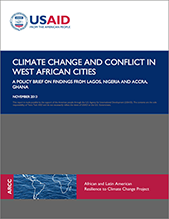Climate Change and Conflict in West African Cities


Executive summary
As discussion continues over the initial findings of the Fifth Assessment Report of the Intergovernmental Panel on Climate Change (IPCC), it is worth recalling one of the consequences of the IPCC’s Fourth Assessment Report in 2007: the growing concern that climate change might increase instability and conflict in the developing world. Since then, intelligence and defense analysts, development specialists, think-tank experts, and academics from a variety of disciplines have proposed, discussed, mapped, and investigated potential climate and conflict linkages.
Generally speaking, that wave of analysis has found that the connections between climate change and conflict, while worthy of sustained attention, were less direct than early speculation had suggested and were more complex than was initially understood (Gleditsch, 2012; Stark, 2013). Context-specific, non-climate factors (e.g., governance, livelihoods, identity, history) remain the core variables that must be taken into account and understood first. The question then becomes how climate stresses interact with these core variables in ways that may contribute to future conflict.
Most early studies on climate change and conflict focused on threats to rural livelihoods (agriculturalists, pastoralists), food security, and access to land and water resources among groups living in the countryside. The work done to date for the United States Agency for International Development (USAID) on climate change and conflict reflects this orientation, with previous studies focusing on largely rural areas in Uganda, Ethiopia, Peru, Nepal, and the Niger River basin.But Latin America and many parts of Asia already have high rates of urbanization, and Africa is witnessing an unprecedented shift of its population toward urban centers. One coastal zone that has a particularly dense and rapidly growing population is the littoral zone of the Gulf of Guinea in West Africa.
To address the relative lack of research on climate-conflict linkages in large urban areas, USAID asked the Foundation for Environmental Security and Sustainability (FESS) to conduct a case study on two major West African cities – Lagos, Nigeria and Accra, Ghana. Field research was carried out for the case study in June and August 2013, and this policy brief presents the findings on the central questions addressed by that investigation:
-
Are the effects of climate change likely to lead to chaotic and conflictive scenarios in West African cities?
- If so, under what circumstances and over what time frame; and are there preventive actions that governments and donors should take?
For each city, the political, economic, and demographic setting relevant to stability and instability is briefly examined, as well as recent and projected climate trends and vulnerabilities, followed by adaptive responses from government and other stakeholders.
Suggested citation
Stark, J., Tersawa, K. 2013. Climate Change and Conflict in West African Cities: A Policy Brief on Findings from Lagos, Nigeria and ACCRA, Ghana. USAID.
(0) Comments
There is no content